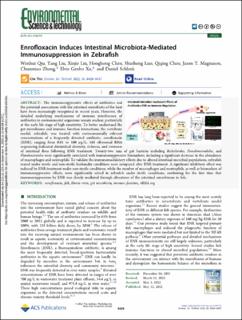| dc.contributor.author | Qiu, Wenhui | |
| dc.contributor.author | Liu, Tang | |
| dc.contributor.author | Liu, Xinjie | |
| dc.contributor.author | Chen, Honghong | |
| dc.contributor.author | Luo, Shusheng | |
| dc.contributor.author | Chen, Qiqing | |
| dc.contributor.author | Magnuson, Jason Tyler | |
| dc.contributor.author | Zheng, Chunmiao | |
| dc.contributor.author | Xu, Elvis Genbo | |
| dc.contributor.author | Schlenk, Daniel | |
| dc.date.accessioned | 2022-09-07T11:36:53Z | |
| dc.date.available | 2022-09-07T11:36:53Z | |
| dc.date.created | 2022-09-06T11:57:16Z | |
| dc.date.issued | 2022-05-12 | |
| dc.identifier.citation | Qiu, W., Liu, T., Liu, X., Chen, H., Luo, S., Chen, Q., ... & Schlenk, D. (2022). Enrofloxacin Induces Intestinal Microbiota-Mediated Immunosuppression in Zebrafish. Environmental Science & Technology. | en_US |
| dc.identifier.issn | 0013-936X | |
| dc.identifier.uri | https://hdl.handle.net/11250/3016298 | |
| dc.description.abstract | The immunosuppressive effects of antibiotics and the potential associations with the intestinal microbiota of the host have been increasingly recognized in recent years. However, the detailed underlying mechanisms of immune interference of antibiotics in environmental organisms remain unclear, particularly at the early life stage of high sensitivity. To better understand the gut microbiome and immune function interactions, the vertebrate model, zebrafish, was treated with environmentally relevant concentrations of a frequently detected antibiotic, enrofloxacin (ENR), ranging from 0.01 to 100 μg/L. 16S ribosomal RNA sequencing indicated diminished diversity, richness, and evenness of intestinal flora following ENR treatment. Twenty-two taxa of gut bacteria including Rickettsiales, Pseudomonadales, and Flavobacteriales were significantly correlated with immunosuppressive biomarkers, including a significant decrease in the abundance of macrophages and neutrophils. To validate the immunomodulatory effects due to altered intestinal microbial populations, zebrafish reared under sterile and non-sterile husbandry conditions were compared after ENR treatment. A significant inhibitory effect was induced by ENR treatment under non-sterile conditions, while the number of macrophages and neutrophils, as well as biomarkers of immunosuppressive effects, were significantly salved in zebrafish under sterile conditions, confirming for the first time that immunosuppression by ENR was closely mediated through alterations of the intestinal microbiome in fish. | en_US |
| dc.language.iso | eng | en_US |
| dc.publisher | ACS Publications | en_US |
| dc.rights | Attribution-NonCommercial-NoDerivatives 4.0 Internasjonal | * |
| dc.rights.uri | http://creativecommons.org/licenses/by-nc-nd/4.0/deed.no | * |
| dc.subject | enrofloxacin | en_US |
| dc.subject | fish | en_US |
| dc.subject | Danio rerio | en_US |
| dc.subject | gut microbiota | en_US |
| dc.subject | immune function | en_US |
| dc.subject | rRNA seq | en_US |
| dc.title | Enrofloxacin Induces Intestinal Microbiota-Mediated Immunosuppression in Zebrafish | en_US |
| dc.type | Journal article | en_US |
| dc.type | Peer reviewed | en_US |
| dc.description.version | publishedVersion | en_US |
| dc.rights.holder | The authors | en_US |
| dc.subject.nsi | VDP::Technology: 500::Biotechnology: 590 | en_US |
| dc.subject.nsi | VDP::Mathematics and natural science: 400::Zoology and botany: 480::Marine biology: 497 | en_US |
| dc.source.pagenumber | 8428-8437 | en_US |
| dc.source.volume | 56 | en_US |
| dc.source.journal | Environmental Science and Technology | en_US |
| dc.source.issue | 12 | en_US |
| dc.identifier.doi | 10.1021/acs.est.1c08712 | |
| dc.identifier.cristin | 2049160 | |
| cristin.ispublished | true | |
| cristin.fulltext | original | |
| cristin.qualitycode | 2 | |

